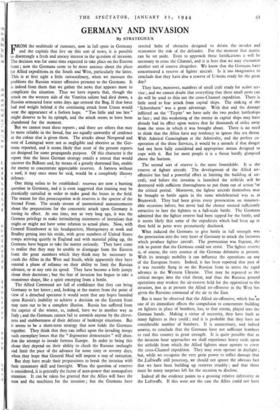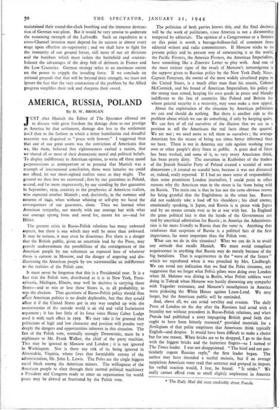GERMANY AND INVASION
By -STRATEGICUS
but we cannot trust these reports ; and there are others that may be more reliable in the broad, but are equally unworthy of credence in the colour that is given- them. The attacks about Novgorod and west of Leningrad were not as negligible and abortive as the Ger- mans reported, and it seems likely that most of the present reports are designed for some propaganda purpose. Of this character is the report that the latest German strategy entails a retreat that would uncover the Balkans and, by means of a greatly shortened line, enable the enemy to concentrate appreciable reserves. A fortress without a roof, it may once more be said, would be a completely illusory defence.
One thing seems to be established: reserves are now a burning question in Germany, and it is even suggested that training may be drastically curtailed in order to make good the losses in the field. The reason for this preoccupation with reserves is the spectre of the Second Front. The steady stream of unemotional announcements about the preparations for the concentric attack upon Germany is having its effect. At one time, not so very long ago, it was the German privilege to make intimidating statements of intentions that might-or might not have some relation to actual plans. Now, with General Eisenhower at his headquarters, Montgomery at work and Bradley getting into his stride, with great numbers of United States troops arriving quietly in England and with material piling up, the Germans have begun to take the matter seriously. They have come to realise that they may be unable to disengage from the Eastern front the great numbers which they think may be necessary to crush the Allies in the West and South, while apparently they have entered a phase of reliance on their ability to limit the Russian advance, or at any rate its speed. They have become a little jumpy about their decisions ; but the fear of invasion has begun to take a monstrous shape, like a spirit emerging from a bottle.
The Allied Command are full of cOnfidence that they can bring Germany to her knees ; and, looking at the matter from the point of view of a detached spectator it would seem that any hopes founded upon Russia's inability to achieve a decision on the Eastern front may turn out to be a complete illusion. Russia has suffered from the caprice of the winter, as, indeed, have we in another way in Italy ; and the Germans cannot fail to astonish anyone by the clever- ness and stubbornness of their defence of bankrupt situations. But it seems to be a short-term strategy that now holds the Germans together. They think that they can inflict upon the invading troops such exemplary losses that the " degenerate democracies" will aban- don the attempt to invade fortress Europe. In order to bring this about they depend on their ability to check the Russian onslaught and limit the pace of the advance for some sixty or seventy days, when they hope that General Mud will impose a stay of execution.
But they have made their preparations to break the invasion with their customary skill and foresight. When the question of reserves is considered, it is generally the factor of man-power that monopolises attention. It can be taken for granted thar the Allies will have the men and the machines for the invasion ; but the Germans have erected belts of obstacles designed to detain the invader and economise the risk of the defender. For the moment that matter can be set aside. Even to approach these fortifications it will be necessary to cross the Channel, and it is here that we may encounter another sort of reserve altogether. We know that the Germans have concentrated a reserve of fighter aircraft. Is it too imaginative to conclude that they have also a reserve of U-boats ready for the great day?
They have, moreover, numbers of small craft ready for active ser- vice ; and we cannot doubt that everything that these small pests can do will be used to thin out the cross-Channel expedition. There is little need to fear attack from capital ships. The sinking of the Scharnhorst ' was a great advantage. With that and the damage inflicted on the Tirpitz ' we have only the two pocket battleships to face ; and this weakening of the enemy in capital ships may have already had its effect upon waters that lie thousands of miles away from the areas in which it was brought about. There is no need to think that the Allies have any tendency to ignore this sea threat. With Admiral Cunningham at the Admiralty, and the perfect co- operation of the three Services, it would be a miracle if that danger had not been fully considered and appropriate means designed to cope with it. But for most people it is a threat hardly glimpsed above the horizon.
The second sort of reserve is the more formidable. It is the reserve of fighter aircraft. The development of the Allied air- offensive has had a powerful effect in limiting the building of air- craft, and before the invasion is launched the airfields will be destroyed with sufficient thoroughness to put them out of action for the critical period. Moreover, the fighter aircraft themselves may be brought to battle again in the same wholehearted way as at Brunswick. They had been given every provocation on innumer- able occasions before, but never had the chance seemed sufficiently attractive to lure the fighters to a full-scale battle. The Germans admitted that the fighter reserve had been tapped for the battle, and it seems likely that some of the expedients which had been up to then held in petto were prematurely disclosed.
What induced the Germans to give battle in full strength was the penetration into the very heart of Germany to attack the factories which produce fighter aircraft. The provocation was flagrant, the risk so patent that the Germans could not resist. The fighter reserve is, of course, the very essence of the German defensive at present. With its strategic mobility it can influence the operations on any of the European fronts. Indeed, it has been reported that part of it was recently flung in on the Russian front to arrest the rapid advance in the Western Ukraine. That may be repeated as the critical merges into the vital threat, and thus the Russian ground operations may weaken the air-reserve held for the opposition' to the invasion, just as at present the Allied air-offensive in the West has given the Russians command of the air in the East.
But it must be observed that the Allied air-offensive, which has as one of its immediate effects the compulsion to concentrate building on fighters in place of bombers, has, to that extent, played into the German hands. Making a virtue of necessity, they have built as many fighters as they could ; and it is probable that they have no considerable number of bombers. It is unnecessary, and indeed unwise, to conclude that the Germans have not sufficient bombers to raid this country in great strength. It is quite possible that as the invasion hour approaches we shall experience heavy raids upon the airfields from which. the Allied fighters must operate to cover the cross-Channel expedition. They may even operate in daylight ; but, while we recognise the very great power to inflict damage that the .Lurtwaffe still possesses, we should not ignore the obvious fact that we have been building up reserves steadily ; and that there must be many surprises left for the occasion to disclose.
Indeed all the evidence points to a growing relative inferiority in the Luftwaffe. If this were not the case the Allies could not have maintained their round-the-clock bombing and the immense destruc- tion of German war-plant. But it would be very unwise to underrate the remaining strength of the Luftwaffe. Such an expedition as a cross-Channel invasion must depend for its success at almost every stage upon effective air-superiority ; and we shall have to fight for the immunity of our ground forces, still more of our - air divisions and the bombers which must isolate the battlefield and counter- balance the advantages of the deep belt of defences in France and the Low Countries. German strategy relies to an enormous extent on the power to cripple the invading force. If we conclude on rational grounds that that will be beyond their strength, we must not ignore the fact that the very contraction of the problem by the Allied progress simplifies their task and sharpens their sword.



























 Previous page
Previous page